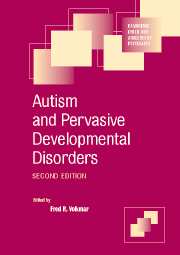Book contents
- Frontmatter
- Contents
- List of contributors
- Preface to the second edition
- 1 Diagnosis and definition of autism and other pervasive developmental disorders
- 2 Epidemiological surveys of pervasive developmental disorders
- 3 Psychological factors in autism
- 4 Communication and its development in autism spectrum disorders
- 5 Genetic epidemiology of autism spectrum disorders
- 6 The neurobiology of autism
- 7 Psychopharmacology
- 8 Behavioral and educational approaches to the pervasive developmental disorders
- 9 The outcome in adult life for people with ASD
- 10 Autism, social neuroscience, and endophenotypes
- Index
9 - The outcome in adult life for people with ASD
Published online by Cambridge University Press: 19 August 2009
- Frontmatter
- Contents
- List of contributors
- Preface to the second edition
- 1 Diagnosis and definition of autism and other pervasive developmental disorders
- 2 Epidemiological surveys of pervasive developmental disorders
- 3 Psychological factors in autism
- 4 Communication and its development in autism spectrum disorders
- 5 Genetic epidemiology of autism spectrum disorders
- 6 The neurobiology of autism
- 7 Psychopharmacology
- 8 Behavioral and educational approaches to the pervasive developmental disorders
- 9 The outcome in adult life for people with ASD
- 10 Autism, social neuroscience, and endophenotypes
- Index
Summary
Accounts of adults with autism spectrum disorders (ASD)
Despite the ever-increasing number of publications on the topic of autism, relatively little has been written about outcome in adulthood. Moreover, the accounts that are available can present a very confusing picture to families seeking to know what may become of their son or daughter as they grow older. On the one hand, the problems shown by adults with ASD often feature prominently in books or papers dealing with “challenging behaviors” (Clements & Zarkowska, 2000). Lurid accounts of crimes committed by individuals with Asperger's syndrome also appear from time to time in daily newspapers. In contrast, there are impressive personal narratives by people with autism spectrum disorders (ASDs) who have managed to cope admirably with many of the problems they have encountered throughout their lives (see for example autobiographical accounts by Gerland, 1997; Grandin, 1995; Holliday Willey, 1999, Lawson, 2002; Williams, 1992, 1994). There are individual case reports, too, of individuals who, although impaired in many aspects of their functioning, show remarkable skill in certain specific areas, such as art, music, or numerical calculations (Hermelin, 2001).
In fact, most people with ASD fall into none of these categories, but families are provided with very little guidance or information on what the future is likely to hold.
- Type
- Chapter
- Information
- Autism and Pervasive Developmental Disorders , pp. 269 - 306Publisher: Cambridge University PressPrint publication year: 2007
- 10
- Cited by



